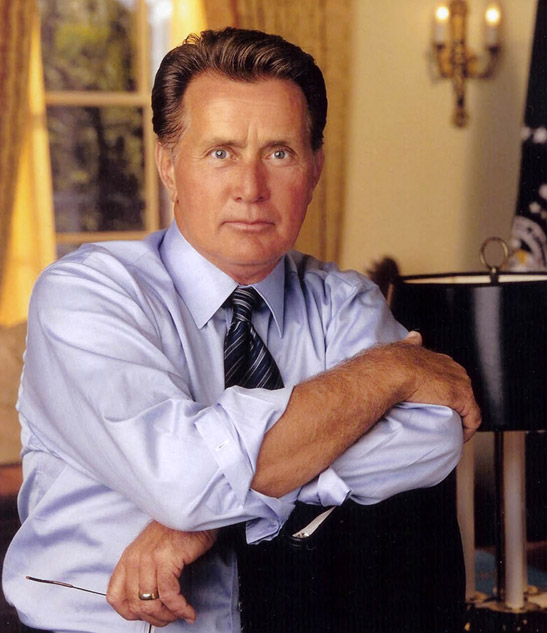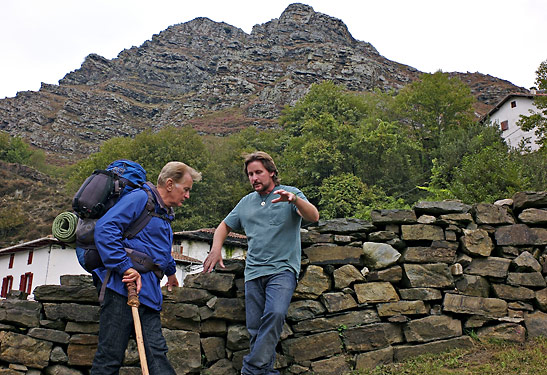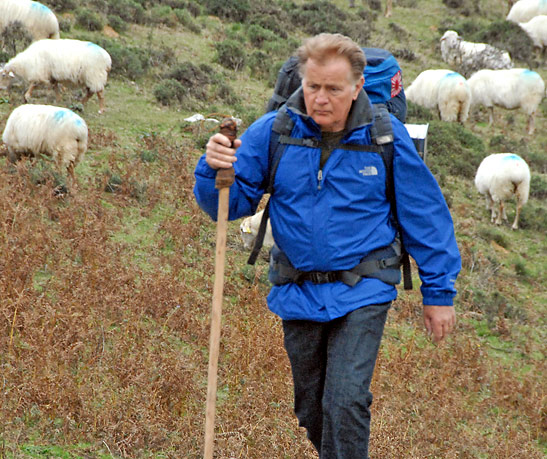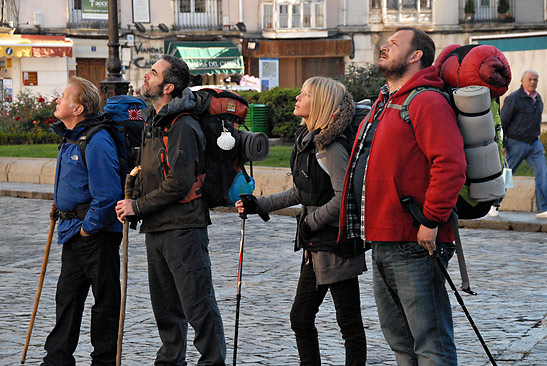 |
 |
|
 |

|
Exclusive Interview
with Martin Sheen…Up Close and Personal
Exquisitely written and directed, “The Way,” is a poignant, character-driven, meticulously-shot film which centers around Sheen’s character of Tom, a no-nonsense affluent California ophthalmologist who receives tragic news that his son has been killed in a storm while trekking on the Camino de Santiago de Compostela, a famous pilgrimage people have been doing for a thousand years. He goes to St.-Jean-Pied-de-Port in France to collect the remains of his son, played by Emilio, but instead of returning home, decides to honor his memory by making the historical pilgrimage himself. His journey becomes a profound, life-changing experience as he meets other trekkers who individually and collectively impact on his life. Sheen is surrounded by a wonderful supporting cast, which includes Deborah Kara Unger, Yorick van Wageningen, and James Nesbitt. The following exclusive interview was conducted in the Tavis Smiley Green Room and has been edited for print purposes. Cohn: What inspired you to become an actor? Martin: I don’t have any conscious memory of wanting to be an actor, but early on, there was something in my makeup that I felt comfortable with. Then when I was around five or six, I started going to the movies and gradually it dawned on me that I was like one of those people on the screen. And that was it. There was never any question or doubt about what I was going to do for a living. When I was 15 and a sophomore in high school in Dayton, Ohio, I was doing plays and was in love with theatre. I was working with an amateur company called the Black Friars and knew I was getting ready to hit New York after I graduated. Then someone told me about a movie, which starred this young actor by the name of James Dean. So, I went to see “East of Eden” and witnessed something so extraordinary that it had a powerful effect on me. This guy wasn’t ‘acting’ as he transcended the craft into behavior. Cohn: What happened as a result of seeing that film? Martin: That changed the direction of the kind of actor I was going to be. The first time I went in front of a camera, I really appreciated how good he was because he made it look as though he just showed up and they happened to catch him doing things, but every move was blocked, lit, and photographed. That’s the epitome of an artist – to make it look so easy, so comfortable, so natural, that everybody would think they could do it too.
Cohn: “The Way” is the story about a man who loses his son. What drew you to the part of Tom? Martin: Frankly, I haven’t been offered this good a part or a lead role that carries the picture in 30 years. I’ve been in some good films, but Emilio wrote this film for me. I think most actors rarely get the opportunity to play something really close to you and speaks to something you deeply believe. This was a gift, a love letter. We worked closely throughout the writing process and it was like he was writing a symphony and asked me to play first violin. He assured me there was a crescendo here and there, but it wasn’t the climax yet. It would be a finished symphony, but I would have to be ruled by his conducting.
Cohn: During the filming did you experience a change in yourself? Martin: It was an opportunity and an experience beyond anything I had anticipated. I decided not to train for the role because Tom doesn’t know he’s going to Spain to do the journey. It’s an impromptu decision he makes at a moment of inspiration. I thought what would it really be like for someone to carry that heavy backpack and to do that journey without training. Emilio agreed and said that I was quite right and that the character would display that old American “can-do” attitude to the point where he damn near drowns and almost loses the bag containing his son’s ashes. I would say that the film was more about who we were and what we discover about ourselves along “The Way.” Cohn: Do you have a personal connection to Spain? Martin: My father was a Gallego from Salceda de Caselas, a little village in Galicia near the Cathedral Santiago de Compostela in Northern Spain. I grew up having this romantic image about the Camino de Santiago pilgrimage and thought that some day I would make that journey. So between the season in 2003 and 2004 of “The West Wing” I said, “We’re going!” I was ill prepared and didn’t have a clue. We had no backpacks or other necessary equipment. All I had was information on this sacred road that I wanted to experience. Cohn: Any relatives living in Spain? Martin: My sister lives in Madrid. She said, “You’re not going to finish in two weeks; you won’t even make it from here to Burgos.” She said we should drive and research it for future reference, which we did. Cohn: Emilio commented on the lack of studio support and your decision to go independent. Can you talk about how you’re marketing the film? Martin: A couple of studios and distributors said yes, but added that if it didn’t work, we’d go right to DVD. We felt those guys didn’t have the passion we had and decided that we would take the film to that part of the country referred to as “fly over states” – the land between New York and Los Angeles. We were certain that if we could reach people with this wonderful, very deeply human adventure, this road picture would be successful. So, we made a seven-week journey in a bus across the country covering 27 cities, plus Virginia Tech University. Our film is about healing and that community has done more healing than any center in the country. Cohn: Did you encounter any problems during the shoot? Martin: There was never a problem. We were on a limited budget and time and had to shoot in sequence, which was the only way we could do it. We used whatever happened along the way. For example, if someone got hurt, they would carry that injury to the next village because we couldn’t jump ahead since we didn’t know what awaited us. We had to trust the script and each other. All of those wonderful things that happened, we call them miracles, did really happen. Cohn: Did you meet a lot of trekkers along the way? Martin: Oh yes. All of the people you see in the film (except for the actors) are pilgrims. We had release forms in about twelve languages that they signed. (laughing) People were getting off trains and would walk in front of the camera. The AD (assistant director) was going crazy, but Emilio would say, “Would you mind going back and being in our film?” “Oh we will,” they said. We were passing trekkers on the road who wanted to be in the film. Emilio tells me that many of them are asking if their scenes are in the final cut. (laughs) Cohn: What was the biggest challenge you faced? Martin: Getting permission to film inside the church. We knew with absolutely certainty that even though we had done something very special, that no one had ever done before, no one was ever allowed to film inside the Cathedral Santiago de Compostela. There was newsreel footage and an occasional documentary, but they would never allow anyone inside with a crew. So, 48 hours before we arrived, we had no approval to film inside the church. It’s like getting to Oz and the door is shut and there is no Oz. But it was truly about trusting that there was something more powerful than we were. We understood their reticence because they didn’t know us, and didn’t know what our intent was. Little did they know that we came with every due respect. We offered to alter the script and remove anything that they disapproved of. Then they discovered that I am a Gallego and that my father and our producing partners were from there and finally said ok, making us the first ones to be so honored. Cohn: The last sequence in the church was incredibly moving. What kind of audience reaction did you get at screenings? Martin: Q & A’s followed the screenings so we would go into the theatres during the cathedral scene. It was stone silence and some people would burst into tears as they watched the huge Botafumeiro (incense burner) swinging back and forth dispensing puffs of incense, a ritual going back to the Middle Ages. They were not tears of sorrow – they were tears of joy because people were lifted up.
Cohn: Was it the intention to have people experience a deep emotion? Martin: No. We did it with the intention of the characters exploring where they were and embracing their brokenness and humanity in a joyful way. The characters’ conversions were really a discovery of being loved and you can’t lose that love through anything you do, and you can’t gain it through anything you don’t do. A famous prophet once said, “When we discover that love, we have discovered fire for the second time.” Isn’t that a great image? We begin to have compassion in ways that we never had before. Cohn: You’ve worked with all your children. What’s that like? Martin: In 1989 I directed Charlie in a little film called “Cadence.” It was released during the height of the Gulf War so no one ever saw it. Charlie was quite wonderful. My other son, Ramon, was in the film as well. I also directed a television show with my daughter, Renée. Frankly, it’s the most fun because we all know the machine and know all the buttons to push, or not to push because we helped build the machine. We have great fun and celebrate each other and pull for each other. The most satisfying thing in my life and my career is to work with my children. It doesn’t get any better than working with Emilio on this film. Cohn: I’ve conducted over 100 high-profile celebrity interviews and when I mentioned that I was going to be interviewing you, people almost wanted to genuflect. You are held in the highest esteem. Martin: (Laughs) Oh for heaven sakes. They must have confused me with Bishop Fulton Sheen. (Note: That’s where Martin came up with his last name.) ###### In Part 2, Martin Sheen talks about his marriage,
faith, his political and social activism, and Frank Sinatra. |
This site is designed and maintained by WYNK Marketing. Send all technical issues to: support@wynkmarketing.com

|














